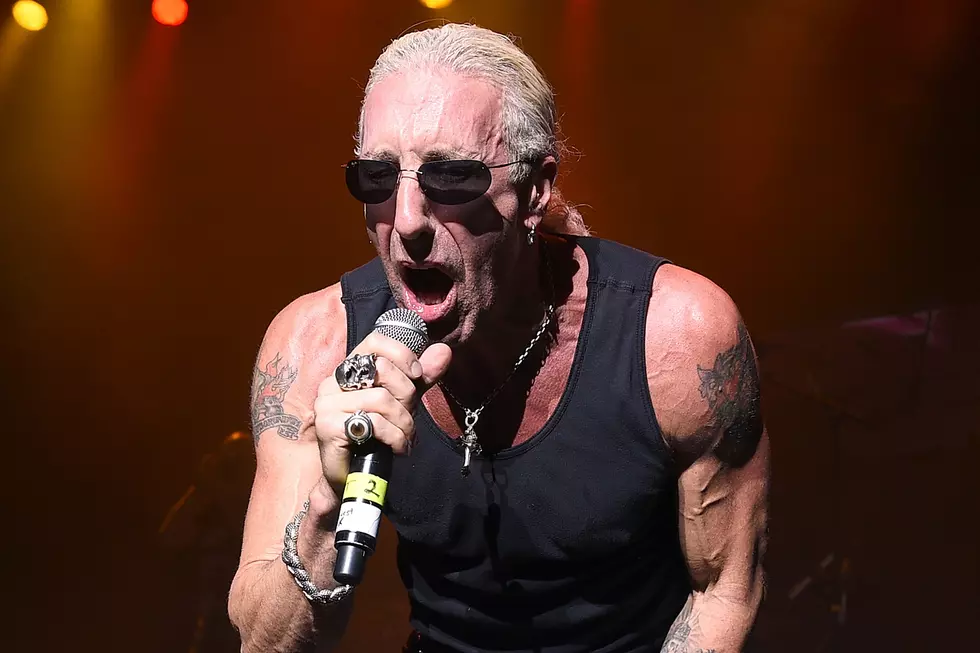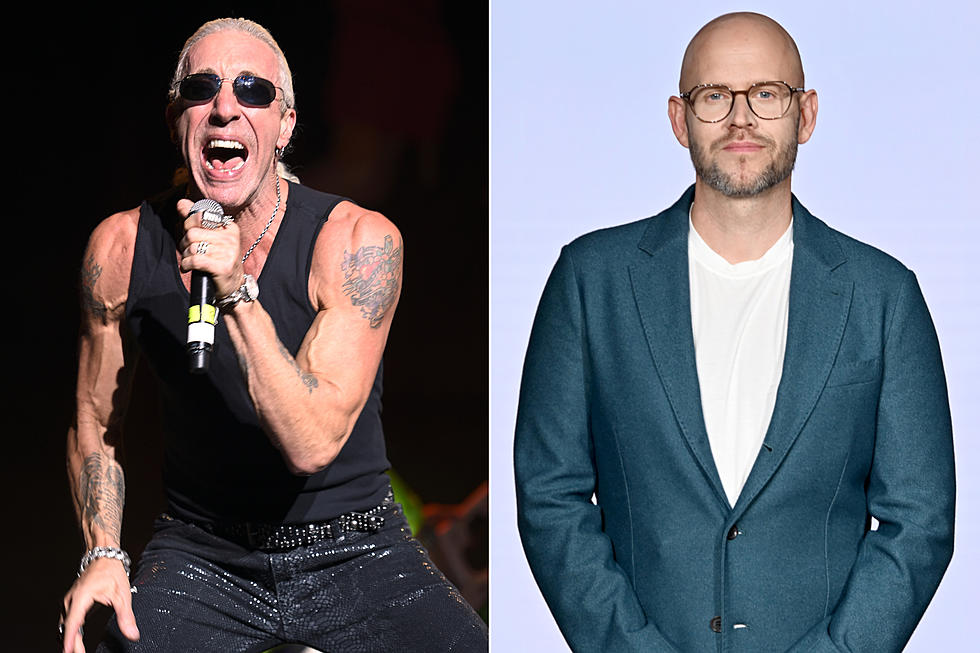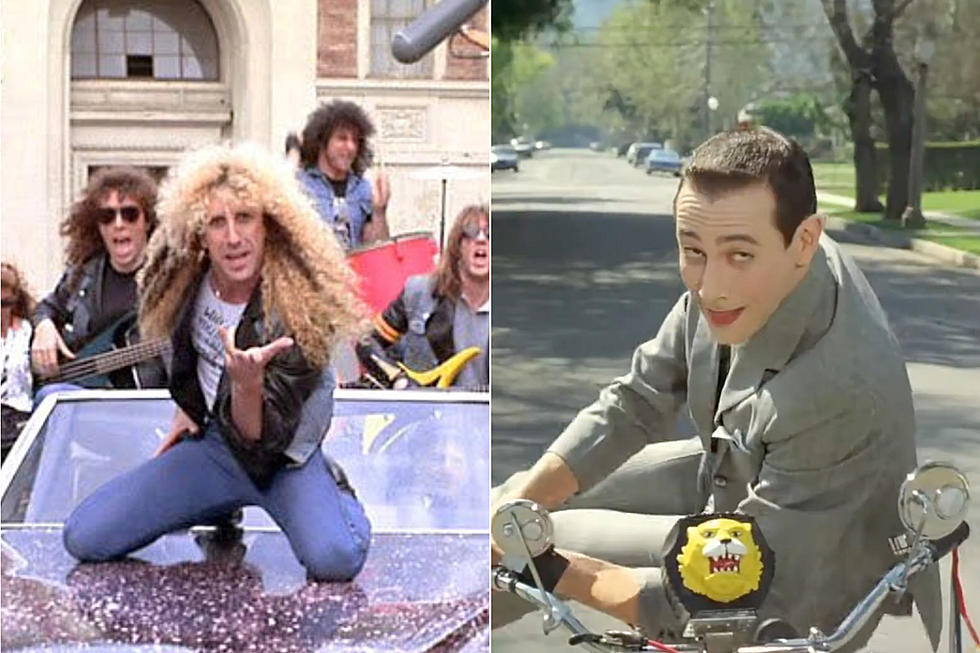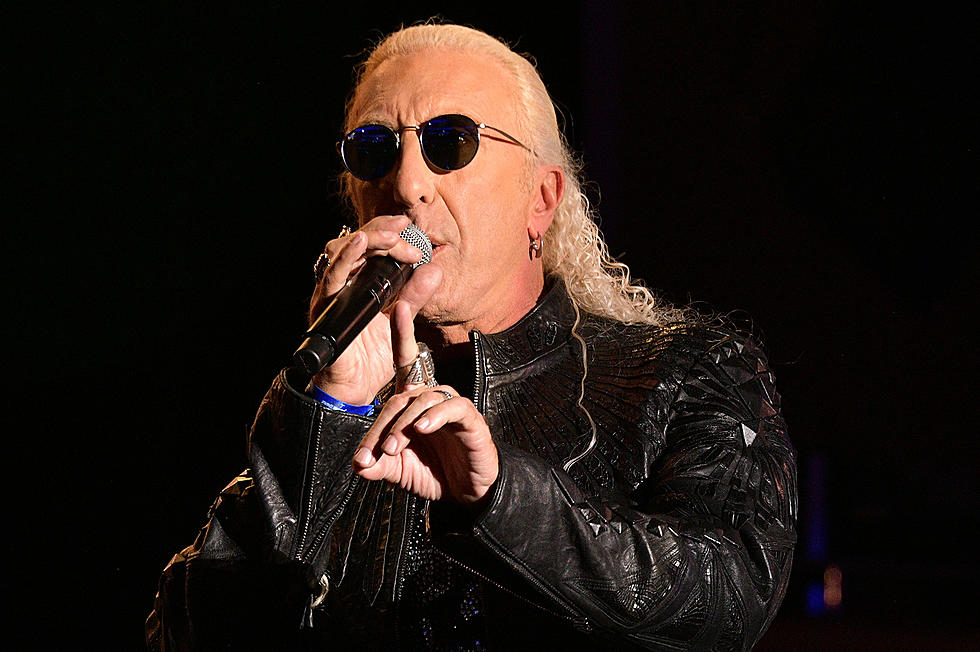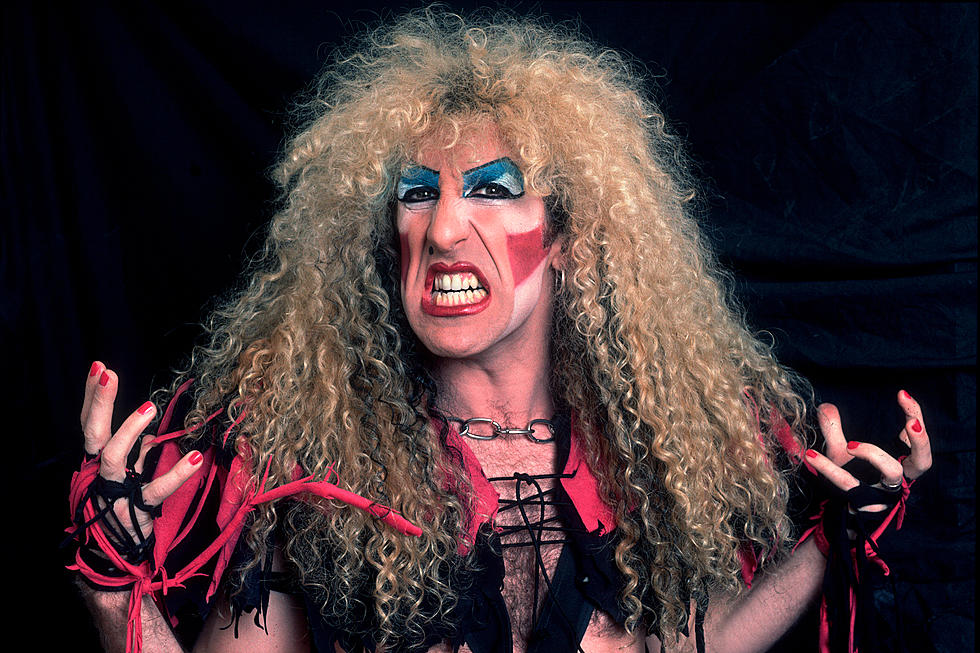
The Day Dee Snider Took on the Senate With a ‘Famous Hair Flip’
In 1985, after finally earning mainstream success with Stay Hungry, Dee Snider and the members of Twisted Sister were in the beginning stages of their next album. They would encounter an unexpected roadblock, however, as controversy began to build around the Parents Music Resource Center, an organization that hoped to enact a ratings system for music.
Founded by Tipper Gore (former spouse of then-Sen. Al Gore), Susan Baker (who was married to treasury secretary James Baker) and two others, the PMRC quickly found themselves with an unwanted nickname – the “Washington wives” – because of their government connections.
Still, the group used that bully pulpit to gain attention for their infamous “Filthy Fifteen,” a list of songs they found particularly objectionable because of sexual content, references to drug and alcohol abuse, the occult and violence.
Twisted Sister appeared on the list, next along with AC/DC, Judas Priest, Motley Crue, Black Sabbath and W.A.S.P. A video for “We’re Not Gonna Take It” put the band in the PMRC crosshairs, who flagged it for violent content – even though it’s clearly tongue in cheek.
Snider says he drew inspiration from his love of cartoons, and movies like Blazing Saddles. He originally conceived an “elaborate story-driven video,” Snider says in his 2012 memoir Shut Up and Give Me the Mic, and developed the concept with director Marty Callner – well known for his work directing music videos for Aerosmith, the Scorpions, Whitesnake and numerous others.
“My idea was for a father – like my own – to be yelling at his son to turn down his music and the kid would transform into me and blow his father out a window,” Snider wrote. “The song would kick in and Looney Tunes-esque high jinks would ensue.”
Watch Dee Snider at the PMRC Senate Hearings
His humorous intent, however, went over the heads of the PMRC, who spearheaded a hearing in front of the U.S. Senate on Sept. 19, 1985, that featured testimony from Snider, Frank Zappa and John Denver. PMRC adviser Jeff Ling, a Virginia-based minister, showed the assembled group examples of the objectionable content that they sought to regulate, including music videos and album covers, while also reading excerpts from offending lyrics.
He also specifically addressed the PMRC's issues with Twisted Sister's video content. "'We're Not Gonna Take It' was released as a video, which you saw just a moment ago, a video in which the band members proceed to beat up daddy, who will not let them rock,” Ling said.
Snider has consistently maintained that this was a misinterpretation of his music, even decades. He went further in depth on Twisted Sister's experiences with the PMRC during an interview with UCR, and the aftermath of his electrifying testimony before the Senate.
How do you look back on this experience?
I look back on it with the realization that it was a turning point for me, unbeknownst to me at the time, career-wise. Initially, it was a negative turn for me career-wise. You know, the initial aftermath immediately following was negative. I was portrayed as the poster boy of everything wrong with heavy metal and rock and roll – when in truth, Twisted Sister was one of the least offensive of the bunch. We looked offensive, but content-wise, we really weren’t in the league with some of the other bands that there were these concerns about. So, there was that element of it and there was the immediate [knowledge that] the government was not happy with my performance there that day.
I had the phones being tapped and the packages being checked for a while. So, initially, it was sort of a negative thing that went with it. But ultimately, it turned positive because you realize that, for the first time, people saw me as something other than the guy with the screaming bloody bone in front of his face. Some people took notice and said, “Well hey, this guy’s kind of got a brain. What’s going on here? Maybe there’s more to him.” As I moved forward with my career and started popping up in other areas and things like that and doing other things, I think it kind of connected some of the dots for people that were going, “Oh yeah, I remember. He was kind of smart that day! I guess he’s not an average moronic rocker. He’s sub-average or above average in the moronic scale.”
So, I look back at it as [being] a good thing. I did the right thing and I’m proud of it. I’m glad I did it and not a day goes by that someone does not walk up to me and say "thank you." Not a day. And all ages, young and old. Young kids read about and hear about it – any course about censorship in college covers those hearings – they were significant on that level, and internationally, it represented [something important]. I was reading a book called Heavy Metal Islam [by Mark Levine] and in the book, they’re interviewing some guy in one of these countries that you would never imagine heavy metal to be [popular], and it’s a Middle Eastern Islamic nation and they’re talking with this guitar player from the premier [band] – and that was the point of the book, that the way music and heavy metal is unifying the Middle East, you know, the young people behind the scenes. There’s a unification with music in that we’re not that different.
The writer walked into the guy’s apartment and his screensaver was a picture of me. He goes, “Dee Snider?” and the guy goes, “We all owe Dee Snider for what he did, fighting censorship.” And this is in the Middle East. This was a country that was not being directly affected, but yet the significance of censorship is something they’re dealing with on a much grander scale, I’m sure, than we deal with. Some countries, you know, some people, their music is not just stickered. It’s not allowed. So, it blew my mind to see how far-reaching something like that had gone. It’s pretty amazing.
Watch Twisted Sister's Video for 'We're Not Gonna Take It'
So, after you gave your testimony, you had your phones tapped and packages being checked?
Yeah. I lived in this really secluded area on Long Island. We had this stoner mail delivery guy, because the houses were so far apart, he was driving around in a car to deliver the mail. He came to me one day and he said, “Dude, they’re going through your shit, man. I just wanted to give you a heads up. They’re checking your stuff.” This was right afterwards and then my phones, I was going, “What’s going on with my phone?” I’d hang up and it wouldn’t hang up. I’d hear clicking from time to time, and then I checked the lines and I saw they were being listened in on. They were being tapped. There was a point where I sort of really distanced myself and said, “Look, I’m really not a politician. I was just trying to do the right thing. I don’t want to be Public Enemy No. 1.”
I was feeling very abandoned by the industry and by my fellow musicians. It was initially a really hurtful experience. You know, as a young man born in the ‘50s, going into Washington, even though I’ve lived through the Watergate scandal, I still had this sort of remnants of an idea that Washington, D.C. was Oz and that great people were doing great things for us. I remember it clear as a bell, I left [after] my testimony and a reporter sticks a mic in my face and says, “Dee, how are you feeling?” Without even thinking, I said the word, “Dirty.” Because as I sat there looking at these people and watching what was going on, I said, “These people aren’t better than me. They’re not smarter than me. They’re not as smart and they’re not nice. They’re not good people. They are manipulative, and they are using their power for all of the wrong reasons.” Now, please don’t take this as an anti-patriotic rant. It’s not. It’s just disappointment, which I think people are going through on a grand scale right now in our system of government and what’s going on in Washington.
So, that was hurtful to me to arrive and find out that the RIAA had already agreed to a sticker before we even spoke. They had negotiated a deal; it was already done. They negotiated a deal with the senators and the PMRC to come up with the parental advisory sticker as a compromise to the ratings system the PMRC wanted. Before Frank, me and John even opened our mouths [at] this hearing, it was a moot point. There was that. It was the fact that I thought I was leading the charge and I stood out there on the battlefield with my d– in my hand. Bands, [there was] nobody else [that] spoke up, virtually. I mean, you know, you’ve got Jello Biafra and there’s some people [that did], but on a grand scale, all of the people just went quiet. They just laid low and waited for the dust to settle.
Alice Cooper said to me, he said, “Dee, why did you do that?” I said, “Do what?” He said, “Why did you defend yourself?” I said, “What are you talking about, man?” He goes, “They were saying a bunch of bullshit!” I said, “Well, what would you do?” He said, “I just would have gone in there and said, “Guilty as charged,” and throw myself at the mercy of the court! [Laughs.] He said, “You hurt yourself by defending yourself.” He said, “You did a great job but, you know, the fans didn’t want to hear that. They don’t want you to be smart. They don’t want you to be sober. They didn’t want you to be married and a together guy. They want like a lifestyle there. They want an animal. So, you went in there and you won the battle, but you lost the war!” So, there was that and the fans, they were positively apathetic. I mean, yes, there’s a percentage that saw it and were outraged, but for the most part, you know, the battle cry back then for the fans was, “Now we know what records to buy.” They didn’t get it. They didn’t get the significance of what was going on, and the seriousness of it all.
So, initially, I came away from there, just hugely disappointed in everybody and everything. And then I got attacked by some of my peers for speaking on their behalf, like, “Who is he to speak on our behalf.” I was like, “What?” Ronnie James Dio was one of the people that said that, publicly and loudly. And my first words [with my testimony] were, “I can only speak about my own situation. I can not speak for other artists.” Look at my testimony: That’s the first statement I made, because I knew it would be wrong for me to try and tell them what other people are thinking when they’re writing songs. I can only speak for my situation and what was happening to me, and hopefully it would serve as an example of how this could be misused and misjudged and misrepresented, this whole situation.
Then Ronnie James Dio comes out and trashes me for speaking on behalf of the music industry, which I didn’t do. Yeah, that hurt; I’m a Dio fan! Years later, my brother Mark, who produced a show called Metal Shop for MJI Broadcasting for many years, a nationally syndicated show, he saw Ronnie in a situation and brought it up to Ronnie. He said, “Ronnie, you’re wrong. My brother, the first thing he said, was that I cannot speak on behalf of [other artists].” It was like at a Foundation Forums [event], and Ronnie walked out and the first thing he said wasL “Before I start, I just want to say something. I just found out something and I want to apologize to Dee Snider for something I said in the press.” He apologized, and I really appreciated that, but I wish he had just looked a little more closely first and not jumped to a conclusion that I was speaking on his behalf.
There was a lot of that. It was hurtful, and I was disheartened and disenchanted on so many levels. Then I went through the whole demise of the band, and those Senate hearings didn’t cause it but it didn’t help it. It did not help. You know, parents were saying, “You can go to see Motley Crue, but you can’t go see Twisted Sister,” which I heard on more than one occasion. It’s like, “What?” Nobody really paid attention to the details of what I said. Well, some people did, but a lot of people just saw the face, the picture, the generalizations, the headlines and drew their own conclusions, both within the rock community and outside – and a lot of those were wrong conclusions.
Watch Frank Zappa's Testimony Before the U.S. Senate
Certainly, you had the look and the image that I guess you can understand, generalization-wise, why parents might be cautious. But I can remember seeing you on Nickelodeon's Livewire. You were certainly out there demonstrating that you were an intelligent person.
I never hid my beliefs, or the fact that I was clean and sober and married. You know, I always thought that was the beauty of rock 'n' roll, that it was like the old Burger King commercial – have it your way. [Laughs.] But I was stunned to find out that that wasn’t it. I saw people making comments – and only the unwise few would actually name my name, but I knew who they were talking about – and saying that I wasn’t a real rocker. They’re people out there posing to be rockers and I wasn’t wasted.
It was that kind of negativity going on and again, my look and popularity is what got me [the invitation] to speak on the stand in the first place. I was the most recognizable face in that genre. On the “Filthy Fifteen,” no one was more recognizable than me at that point and they figured, “Oh, great. Let’s get this moron in here and we’ll make a complete fool out of him.” It didn’t quite work out that way. [Laughs.]
One of the things that kind of surprised me watching the footage of the testimony, you walked into a very confrontational situation. Everybody that was questioning you, they were going for you, whether it was Sen. Rockefeller, or obviously, Al Gore. Did you expect that it was going to be so one-sided like that – that you really wouldn’t have a chance to logically make your case and have a serious actual discussion?
I think that I got to and did defend myself admirably and remarkably well, and I say that as an old man looking back at a young man going, “Dude, you were out of your fucking mind!” I go, “Holy shit, what a cocky motherfucker!” I look at myself and I go, “Damn, kids, that was fucking pretty amazing – I’m amazed!” I’m amazed looking back at myself, going, “What balls! How full of yourself do you have to be to strut in looking like that with your cut-off fucking shit on, fuckin’ snakeskin boots and pants so tight that you can tell you’re circumcised.” I’m proud of myself, but man, could I do that again? Could I do that again in that way with that fucking confidence? I don’t know.
I was in an amazing place. Sitting to my right with dark hair, Joe Gerber, he was the tour manager for Twisted Sister and one of my closest friends and he’s still one of my closest friends. He’s a Columbia University graduate, and he and I worked and woodshedded on my speech for like two weeks. He went out and he did the research for me and gathered [information] and he went to one of the PMRC hearings – that bit when I talked about them accusing me of having a T-shirt with a woman spread eagle in chains. He did a lot of research, and we worked together like we were going to trial. He sat there and he’d fire off questions at me. We prepped our asses off and we knew damn well that at some point they were going to say, “What does S.M.F. stand for?”
We sat there and we tried to figure every way around that one and we said, “You know what, we’re just going to have to give them that one.” [Laughs.] So, when that question comes, man, just let it fly, Sick Motherfucking Fans of Twisted Sister. [Laughs.] What are you going to do? But then he comes back with, “Oh, is that a religious group? Is that a Christian group?” Which I did the famous hair flip heard round the world, saying, “Senator, I don’t think that profanity and Christianity have anything to do with each other.” I was expecting to be unloaded on, and I think I handled it pretty good.
You do throw a nice barb at Al Gore when you start off by asking him if he’s a fan of your group.
Oh man, well that one just came out of – I’m in somebody’s office and I’m back there and [when] Denver goes out there, [Gore] goes, “Mr. Denver, I just want to say, I’ve always been a fan of your music” and I go, “Suck up!” And then Zappa walks out and he goes, “Mr. Zappa, I just want to start by saying [that I’m a fan],” and I’m like, “Zappa? You’re a Mothers of Invention fan? BULLSHIT!” [Laughs.] I’m screaming back there. So, the minute I came out, he got ready to open his mouth and, of course, I was really poking the bear and I said, “You’re not going to tell me you’re a fan of my music, are you, Senator?” And his peers laughed. If you listen, you can hear the other senators laughing, because he’s such a fucking suck up and they knew it. They couldn’t say anything, but Dee Snider did and they laughed. He goes, “No, Mr. Snider, I am not a fan of your music.” So, yeah, that was cool and also when I said that, “I can’t help it if Mrs. Gore has a dirty mind.” I love that moment. Love that moment! There were some good moments there. I was having fun!
During your initial testimony, you point out that as a parent, it’s your job to monitor what your children see. One of your suggestions was a pretty simple one that makes a ton of sense. You suggested that parents should listen to and review the materials that their children buy – albums in this case, as an example. Did it surprise you how many of the politicians thought that it was an off-the-wall idea for parents to take the time to listen to the records and review and care about what their kids are into?
Gore was just setting them up and I was knockin’ ‘em down. That also gave me a great moment when he said, “Mr. Snider, do you think it’s reasonable to expect a parent to listen to all of the music that the children listen to?” I said, “Senator, being a parent is not a reasonable thing,” which was really upsetting to him, to be lectured by me – and, again, that got kind of a chuckle out of the crowd from Dee calling him on his bullshit. You know, I’m proud to say, I’ve lived every word I said. Every word. That was three years into my first child’s life. It was actually his third birthday [on] Sept. 19th. I went home that day right away after the hearings and had a birthday party for Jesse. With all four of my children, I adhered to those beliefs, those words, and I lived them.
And by the way, I’m still with the same woman all of these years later. Al Gore and Tipper are not together, and none of my kids have been busted for possession – or anything. Al and Tipper Gore cannot say the same thing. Just pointing that out. Yes, I am bragging. [Laughs.] But as I said, “What we’re talking about here, Senator, is not unreasonable. We’re talking about, I’m assuming, 10 and 11 year olds, nine year olds. We’re concerned about seven and eight year olds. How many CDs are they getting a month? One? Two? So, forty-five minutes of music to an hour? So you’re concerned about the well-being of your child, and to listen to a couple of hours of music, that’s considered unreasonable? That’s an unreasonable effort, if you’re truly concerned about your children’s well-being?”
True to my word, I remember clearly when Eminem put out the album with “Stan” on it and there was all that controversy, and my 11-year old had the album. I listened to it. A) I became an Eminem fan and B) it gave me a chance to actually have a talk about a significant subject with my son, about the whole suicide thing. We talked about the content on that CD. So, I lived those words. When my nine-year old said, “Dad, hey, check out this video game.” What’s the one where you get to shoot and beat up whores and cops?
Grand Theft Auto?
Grand Theft Auto. The first Grand Theft Auto, I’m watching him and I said, “What are you doing?” He goes, “I’m shooting cops.” And I said, “Oh, and we’re taking this. You’re not having this anymore!” [Laughs.] I looked at what he was doing. When my whole family got into Tenacious D, including my six-year old daughter, because we loved "Wonderboy" and we thought they were so funny, I made her her own edited CD that did not have “Fuck Her Gently” on it – because a six-year old should not listen to “Fuck Her Gently.” So, you know, I lived the words that I said. It’s a parental responsibility to monitor and censor if necessary, what their children listen to. It is not the government’s [responsibility].
Watch John Denver's Testimony Before the U.S. Senate
How did you first become aware that there was an issue developing related to your music and the PMRC?
Well, in ‘84 when we were on the road and things were exploding, we’d see and hear that this controversy was starting. It was the Reagan era and it rolled, you know, it got bigger and bigger. We had our own dealings with protests and things like that at shows and in the South, and being arrested for profanity in Amarillo and stuff like that. It just kept growing. So, when we finished touring in March of ‘85 and then we went and started recording, it was still rolling and becoming more and more of a media storm.
So, when we heard there was going to be a Senate hearing, I don’t know how exactly, but my manager’s office called and they wanted to know, “Are you willing to speak on the side of rock bands? I said, “Yeah, definitely; I’ll go.” It was just something that was in the news and continued to grow and grow and grow. But I think that, along with my peers – meaning everybody else – initially, I was very apathetic about it. It kind of seemed like a joke. Like, who is going to take these Washington wives seriously? They sound moronic when they talk and no one’s going to take this seriously. But it just grew and grew and grew, the magnitude of it and here we were, they were having a damn Senate hearing. So, it was like, “Well, now somebody’s got to do something,” so I tried to.
How do you feel when you find out your song is in the midst of all of this? I know it’s always a sensitive thing when somebody misinterprets what a song is about, but this was really on a whole different level. I would guess that it generated a wide range of emotions. Not just the song, but the video, which was what was taking a lot of the heat.
Well, yeah, the video was – and as a matter of fact, the director of the video, Marty Callner, was there and went to Washington with me, because his video was what was being misinterpreted. They wanted to give “We’re Not Gonna Take It” a “V’ for violence, and clearly the visual images they saw in the video, they connected to the song and assumed that lyrically, it represented the same thing. As I said, the lyrics are no more violent than the Declaration of Independence. But you know, it was reactive and typical of so many people to just – look, it’s just human nature. You know, they hear a couple of words and they see a couple of images, and they think they have it figured out. “I don’t have to really pay attention, do I? Do we really have to pay attention? We can just draw our own conclusions!” [Laughs.] And that’s just something I dealt with my whole life, especially with the way I looked and stuff like that. You know, misjudging a book by its cover is something that I’ve dealt with my entire life. This was no different than any other time.
How much of an alliance was there with Zappa and Denver? Did the three of you have conversations going into this whole thing, or were you all kind of operating independently?
Completely independently. I didn’t have any connection with the guys at all. Regrettably, I never got to meet John and shake his hand. Zappa and I, we were concerned. We were back there [before the hearing], and I got to meet Frank and we were hanging out and talking. We had no prior communication, so we showed up and we were back in the back area waiting to go out and talk. He and I were hanging out and I remember that he said, “Can I bring back Dweezil and Moon Unit? They’re big fans,” and I said, “Sure, man.” So these little kids come back and we take pictures and I sign autographs for them.
We’re going, “What do you think John is going to do?” We both knew what he should do, but you know, people have a tendency to forget. It’s like all of these simple right-wing rockers that are out there now. Not like Ted [Nugent]; Ted was always kind of there. But again, the ultra right, I don’t know about that – because you know, Ted did his fair share of draft dodging. But some of these other people that are out there, they’re super right-wing and you know they weren’t always like that, it’s kind of a position of convenience now that they have money and success. They’ve changed. And it does affect you.
John Denver at that time, he was a movie star, a television star, a radio star, you know, he was a darling of the entertainment world and everybody loved John. You know, Mom, apple pie and John Denver. So we were really concerned that he was going to sell us out, but he didn’t. He stood tall and stood his ground, and remembered very well how “Rocky Mountain High” had been banned and very well how his movie Oh God! had been protested – and again, for all of the wrong reasons, misjudged without people really looking and studying what the hell they were protesting about.
Watch Dee Snider Perform 'We're Not Gonna Take It' With Donald Trump
In your testimony, you responded to Sen. Rockefeller, who seemed to be taking his best shot at attacking your ability to be a parent with all of the time that you were spending on the road. He said, “Nine years from now, when your child is 12 and in school, will you take your child with you? You replied, “To be perfectly honest, nine years from now I am going to be well retired and I will be spending more time with my son than any other parent probably ever spends. And that is one of the beautiful things about rock 'n' roll, is that I can retire hopefully at a very early age.” Did you really envision at that point that you would walk away from music in less than a decade?
First of all, this is the one thing that I said that was not true, but it’s not that the intent wasn’t true, it just didn’t pan out that way! I never wanted to rock for the rest of my life. I wanted to be a rich famous rock star and live happily ever after, and it just didn’t work out that way. I really thought, “Okay, I am on the path of righteousness. I am going to clean up.” I figured Come Out and Play and then one more record and then that’s it, I am done. And it didn’t work out. [Laughs.] I’ve done real well for myself, but I’ve had to continue to work and continue to do things and continue to be away from home, so again, I really wanted to – that was my grand plan. But the grand plan didn’t work out, so unfortunately I had to keep working at it and keep doing the best I could.
The Parents Music Resource Center's 'Filthy Fifteen'
Dee Snider's Spouse is One of Rock's Hottest Wives
More From Ultimate Classic Rock
